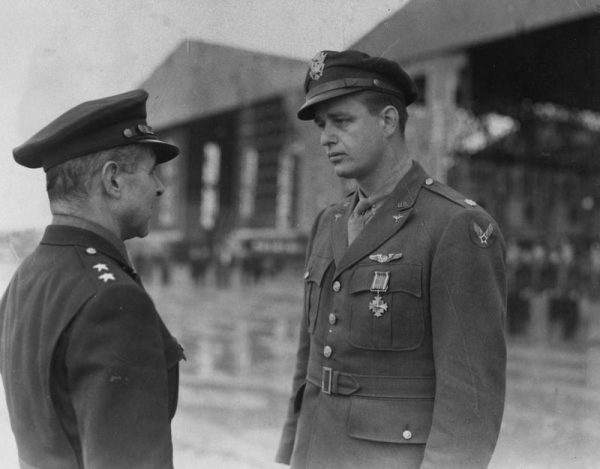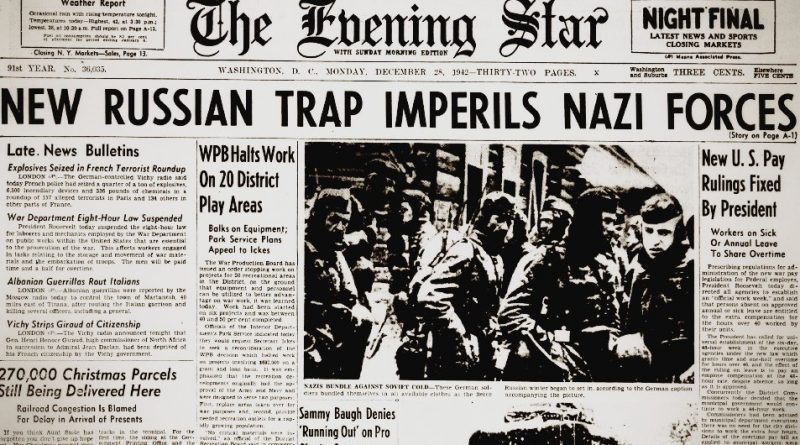World War II Chronicle: December 28, 1942
Click here for TODAY’S NEWSPAPER
On the front page, two Austrian archdukes are about to join the U.S. Army. Carl and Felix are sons of the former Austrian Emperor Charles I. Elder brother Otto was in contact with President Franklin D. Roosevelt and lobbied for a separate battalion of Austrian-Americans — the 101st Infantry Battalion. Brother Rudolf also served in the outfit, as did Werner von Trapp of the famous Trapp Family Singers, who were portrayed in the musical The Sound of Music. The Austrian Battalion with its privates that insist on being called “Grand Duke” is disbanded in June 1943…
Page three mentions that the Yankees have signed veteran middle infielder Bill Knickerbocker. He was recruited into professional baseball by Toledo Mud Hens manager Casey Stengel in 1929. Knickerbocker is released in May and he spends 1943 playing for the Pacific Coast League’s Hollywood Stars before joining the Army as a military policeman… In Africa, the British have missed capturing Marshall Erwin Rommel a second time (page four) and Maj. Gen. George Patton is picture honoring America’s war dead at a Casablanca cemetery (page five)…
Page five also reports that Maj. Gen. Jimmy Doolittle has awarded Lt. Col. Elliot Roosevelt the Distinguished Flying Cross… On page eight, George Fielding Eliot writes that the assassination of French admiral Francois Darlan may actually strengthen the Allies… The sports section begins on page 12, and continues coverage of Sammy Baugh’s absence from the game where the National League All-Stars upset the champion Washington Redskins…

Roving Reporter by Ernie Pyle
WITH THE AMERICAN FORCES IN ALGERIA –(By Wireless) — My own special bomber crew is here in Africa with us now. You may remember it from England. It’s the one known as the House of Jackson — the one where everybody in the crew calls everybody else “Jackson.”
We had a reunion out under the wing of their Flying Fortress. The crew and the plane both looked a little shopworn. Neither had a bath in a long time.
The ground crew hadn’t arrived yet, so the boys were doing all their own mechanical work. They live in their little shelter tents out in the field, under the wing of the bomber. Sometimes they eat “C” rations out of tin cans, and sometimes they go to headquarters to eat in the mess hall.
“What do you do about washing your shirts and such?” I asked them, and they all laughed big and loud. “We don’t,” they said.
But at that they haven’t much on me. I’ve worn the same shirt for two weeks myself.
They’ve already flown on several missions over Tunisia. Some of their comrades have had trouble, but the House of Jackson continues to supply itself with round-trip tickets. “We don’t want to be heroes,” they say. “We just want to get back every time.” But, of course, the chooser doesn’t always get to make his own choice. The battle camps of the world are filled with heroes who’d have preferred not to be heroes.
The House of Jackson’s service stripes make a long line now. There are 10 little bombs in a row painted on the nose, signifying 10 missions under fire. And beneath them are three little swastikas, representing three German planes destroyed.
“Those planes were confirmed,” says the skipper. “But we actually got seven more.”
Two members of the crew have been decorated since we parted in England. Their Fortress didn’t have a name then, but now the nose bears a painting of a vicious-looking devil dancing in a fire and brandishing a pitchfork, and above it the words, “Devils from Hell.”
My boys think they’re pretty tough, and I guess they are. They’ve been hit only once. The other day they dug a piece of flak half as big as your fist out of a wing close to the fuselage, although they weren’t even aware of it when it hit them. Another day they flew 500 miles with only three motors. They weren’t hit that time — the fourth motor just went out normally, and later they installed a spare outdoors, right on the field.
The boys say it’s just as cold at high altitudes over Africa as it was over England. When they go to bomb Bizerte or Tunis, they know there’s fighting going on down there on the ground, but they have never been able to see it. The other day, as they headed east for Bizerte, they met a large formation of JU-88s coming west to attack an Allied convoy. The Americans and the Germans passed about 10 miles apart and just ignored each other.
“What a war!” says Captain Jackson. “We meet each other on the way to bomb each other.”
The 10 men of the House of Jackson are enjoying themselves. They have no kicks at all. They’re used to being dirty now, and they’re glad to be in Africa.
There’s always a little bunch of Arabs squatting around their plane, selling them oranges and other native things. The boys trade cigarettes for eggs, which they cook over their camp fire. They recently changed bases, and the day before moving they “sold” their Fortress to an Arab for 20,000 eggs.
“Won’t he be surprised when he brings those eggs and finds us gone”” said one of the boys. Probably not half as surprised as they’d have been if he really had brought 20,000 eggs.
They’d been to town only once since they came to Africa. Two of them came to my room, took a bath, then got a bottle of vino. They ran onto some American nurses and bought them Algerian black wooden carved dolls as souvenirs. Then they went to a new night club, danced and had what seemed like a hell of a time, but actually wasn’t much.
I was gone when they were in town, but they left a note on my pillow, thanking me for the baths, and signed it “Two Clean Fellows.”
They’ve already lost some of their friends, and one of my other airman friends is gone now, too. He got it on the very first American mission. It’s all like the old early days of the night air mail, when one by one my best friends left and didn’t come back.
I can see these youngsters, who then were in knee pants, going through the same mental phase — always believing it can happen to the other fellow, but never to you. You have to feel that way, or you’d go crazy.
Evening star. (Washington, D.C.), 28 December 1942. Chronicling America: Historic American Newspapers. Lib. of Congress.
https://chroniclingamerica.loc.gov/lccn/sn83045462/1942-12-28/ed-1/
